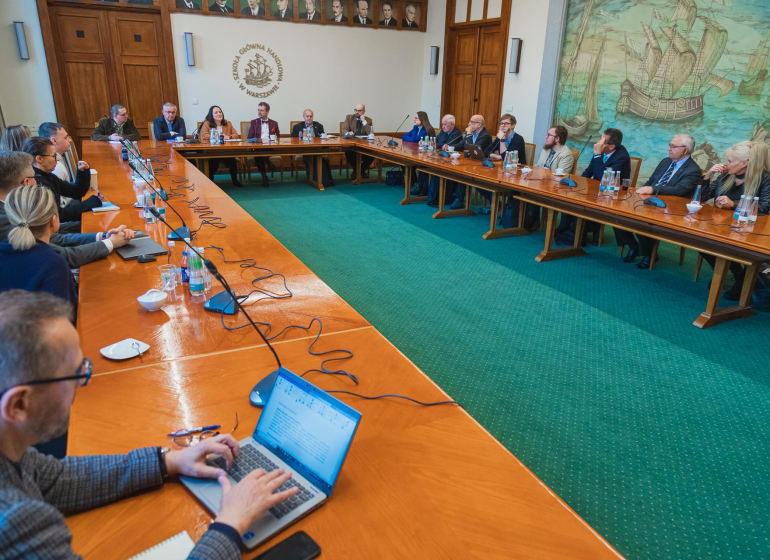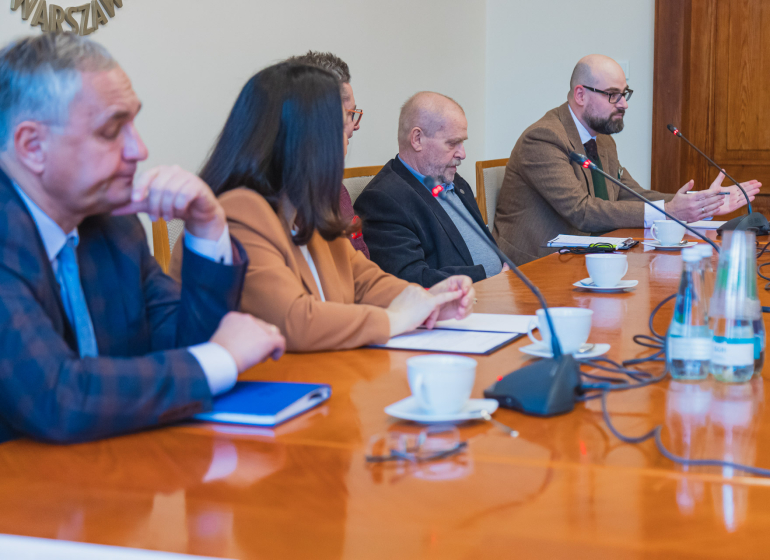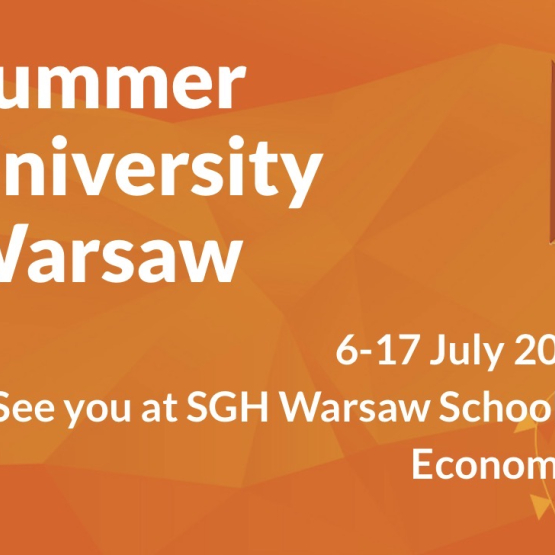“Fair and righteous politician” – an anniversary seminar on Stanisław Wojciechowski for the 100th anniversary of his election as President of Poland
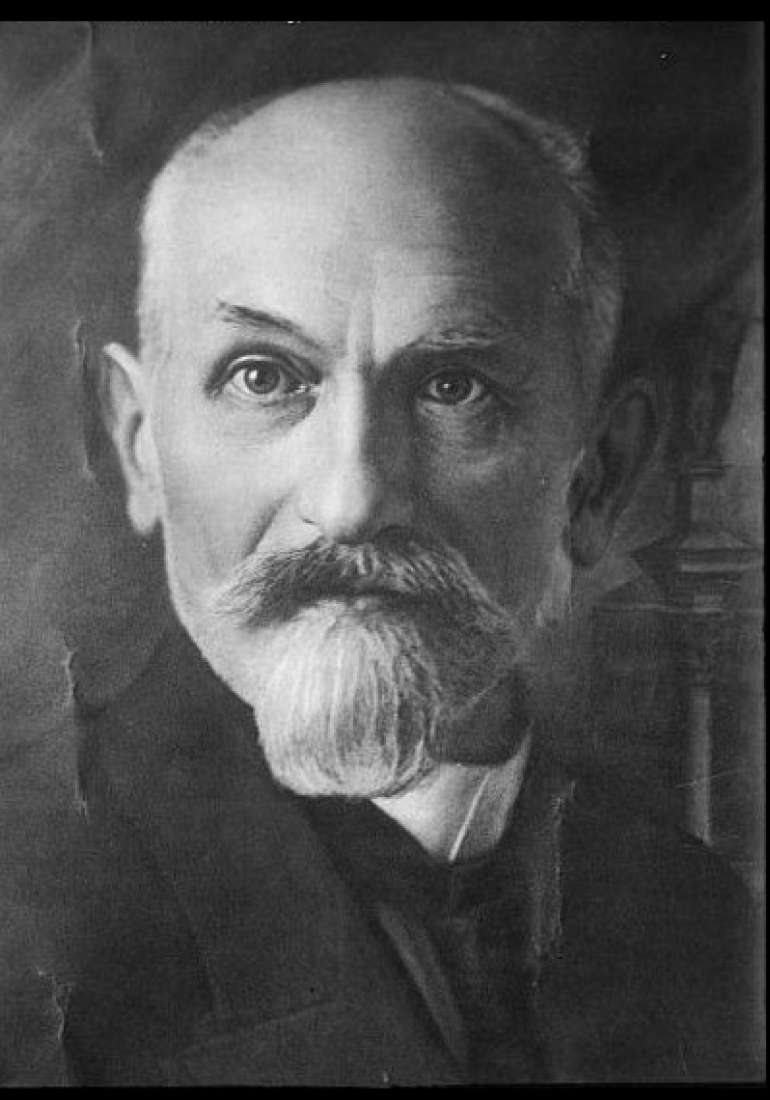
As part of the celebrations of the 100th anniversary of Stanisław Wojciechowski’s election as President of the Republic of Poland, which commenced with the inauguration of the 2022/23 academic year, on 18 November, the School held a seminar titled “Stanisław Wojciechowski – politician, social activist and academic teacher”, organised by the SGH Department of Economic and Social History. It was accompanied by an exhibition of his academic and journalistic papers, prepared by the SGH Library.
The exhibition was prepared with the substantive support of dr Jerzy Łazor, who in 2018 published a comprehensive and critical selection of Stanisław Wojciechowski’s texts. The two-volume issue of “My Memoirs,” as edited by him and with his introduction, was deemed the Historical Book of the Year four years ago.
In his speech during the seminar devoted to the “President from SGH,” dr Jerzy Łazor discussed the conspiratorial activities at the turn of the 19th and 20th centuries, the cooperative work and political activities of Wojciechowski in revolutionary Russia. He also presented the activities that the former professor at the Higher School of Economics/SGH Warsaw School of Economics took as Minister of Internal Affairs.
While pondering what is for scholars a perplexing “split in the biography” of Stanisław Wojciechowski, in whose attitude one may observe a gradual “shift towards right-wing positions,” dr Łazor reminded that regardless of his passion for social activism and the ideas of social justice taken from Edward Abramowski, Wojciechowski – together with Józef Piłsudski – was among those members of PPS who “treated socialism purely functionally” and finally saw the independence of Poland as the paramount objective.
“Already Stefan Żeromski pointed to the inconsistencies in Stanisław Wojciechowski’s biography; he considered his work as Chief of the Ministry of Internal Affairs, an official supervising public life, as contrary to his passion for social activism,” the scholar recalled. “I think the experience of the October Revolution and the memory of Moscow and Saint-Petersburg immediately after the Bolshevik coup, as well as the serious trouble with the departure (escape) from Russia caused Wojciechowski as Minister to do everything in his power not to allow this scenario to be repeated in Poland,” dr Łazor remarked. He added that Stanisław Wojciechowski was a politician that was able to maintain good relations with the followers of Piłsudski, but also with representatives of the National Democracy. He was a desirable partner for all parties.
According to prof. dr. hab. Wojciech Morawski, Head of the Department of Economic and Social History, Stanisław Wojciechowski was “certainly a more interesting president than Ignacy Mościcki.” He had been, as he remarked, “an adventurous politician who was not afraid to assume responsibility.”
In his discussion of the situation in Poland the day before and during the May Coup, prof. Morawski praised the determination of President Wojciechowski not to prolong the conflict in any way – even though he was in the right – as Poland’s neighbours could have taken advantage of this situation. At the same time, as emphasised by prof. Morawski, Stanisław Wojciechowski in fact “did not legalise the illegality of Piłsudski,” and forced others to act overtly, while Piłsudski took the covert path, “contrary to the constitution.” The President from SGH was considered, in prof. Morawski’s words, as someone “too modest, without the lordly splendour, or even someone with the small-town touch.” These overly critical assessments lose significance in light of the honourable and rightful character of Wojciechowski, prof. Morawski argued.
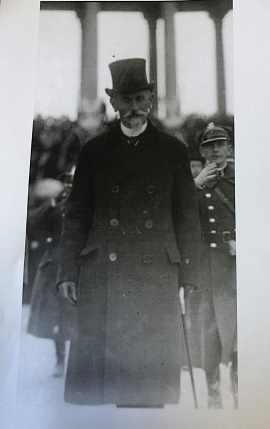
The career of Stanisław Wojciechowski as a scholar of the Higher School of Economics, renamed in 1933 as the SGH Warsaw School of Economics, is incredibly interesting, as demonstrated by dr hab. Jacek Luszniewicz, prof. SGH, in his speech. He presented results of archival research which make it possible to revisit a few common myths. First, “we cannot be one-hundred percent certain when Wojciechowski began his cooperation in 1919. Perhaps this was even in 1918. This would mean he accepted it while he was serving as the Head of the Ministry of Internal Affairs, or just before accepting this post in the Paderewski cabinet.” Archives point to a continuous employment of Stanisław Wojciechowski from December 1920 to March 1940. “After Ludwik Krzywicki, he was one of the longest-employed lecturers in the inter-war SGH,” prof. Luszniewicz remarked.
The documents analysed by him also show that after assuming the office of President, Wojciechowski continued his didactic work at our institution for three months still, holding lectures (2 hrs) and seminar classes (4 hrs). Therefore, our slogan ‘President from SGH’ is not entirely reasonable. We should also speak of a ‘President at SGH,’ at least in January and February 1923,” as the scholar emphasised.
Discussing Stanisław Wojciechowski as teacher, prof. Luszniewicz recalled that “back then, almost two-thirds, or sometimes a half of the lecturers worked at our school under a contract of mandate.” Stanisław Wojciechowski was engaged as an “associate professor, the kind of which was appointed when habilitated scholars in a given field could not be found.” The school’s statutes allowed for engaging “eminent specialists in topics,” and one of them was Stanisław Wojciechowski, who did not have a degree, but was among the few pioneers of the Polish cooperative movement. His 1911 book, Jak założyć stowarzyszenie spożywcze (“How to Set Up a Consumers’ Co-Operative”) was a true best-seller and had several editions. His annual remuneration was around 5,500, which was high given his light class load (a professor on permanent employment received around 1,000 per month). The maximum number of students taking part in Wojciechowski’s classes was 32, and on average, three to five students participated in his seminars.
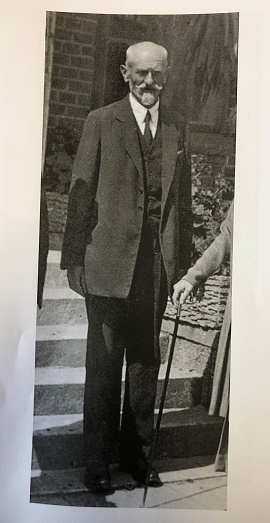
Professor dr hab. Andrzej Zawistowski talked about the life of Stanisław Wojciechowski in the lead-up to World War II, when the ex-president almost completely withdrew from public life, as well about his fate during the occupation and accession of Poland into the Soviet sphere of influence. Both the left and the right wings of the highly polarised Polish political stage wanted to take advantage of his authority to make their efforts credible. Stanisław Wojciechowski never agreed to that.
The fate of the Wojciechowski family was particularly dramatic during the occupation. The son, Edmund, was arrested and sent to Auschwitz for his help to his Jewish lawyer friends. The German occupation authorities made the release of Wojciechowski Junior conditional on the former President signing a letter questioning the legality of the Polish government-in-exile. “At that time, there was a political crisis in London, and the fate of Prime Minister Władysław Sikorski was being decided. Signing such a letter could complicate matters significantly,” prof. Zawistowski explained. “Wojciechowski refused. His son died in Auschwitz. The devastated parents were given an urn with his ashes. Since then, the close family of the former President always had to contend with the question whether the decision of their patriarch was right,” prof. Zawistowski emphasised.
Aside from Wincenty Witos, Stanisław Wojciechowski was the most important politician in the territory occupied by the Third Reich. “It is hardly surprising that the Nazis tried to take advantage of them, and when that failed, they subjected them to repressions,” prof. Zawistowski argued. This was similar during the communist times. Edward Ochab, who Stanisław Wojciechowski knew from his activity at Społem, tried to make use of this acquaintance to legitimise the Polish United Workers’ Party. “Wojciechowski refused to have a meeting with him, and never gave such support to the communists,” the historian said.
After the Warsaw Uprising, during which the Nazis deliberately set fire to their villa, the former President and his wife Maria moved Pruszków, and later settled at his daughter’s place in Gołąbki near Warszawa.
Although the memory of President Wojciechowski is not cultivated in Poland – he has no monument, only one university and high school are named after him, and only eight Polish cities have streets named after him, it is worth remembering this “fair and righteous man who deserves our respect, as he always put the welfare of society and state above his interests,” which is how the moderator of the discussion, dr hab. Aldona Podolska-Meducka, prof. SGH, summed up the conference.
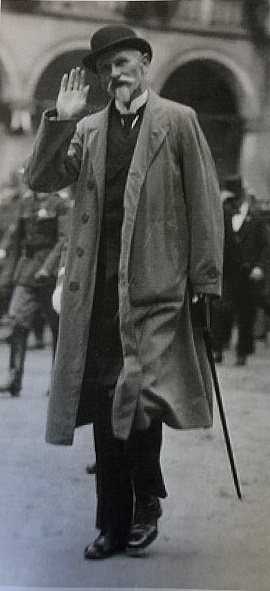
The plans for anniversary celebrations under the slogan “President from SGH” still include events in December; that month, among other things, a plaque commemorating President Wojciechowski and his ties to the SGH will be unveiled on Building A. An exhibition of archival documents related to Stanisław Wojciechowski and his family memorabilia from the collection of his great-granddaughter, Małgorzata Kidawa-Błońska, Vice-Marshall of the Sejm of the Republic of Poland, is also planned. We will further hold a premiere of a biopic prepared for the 100th anniversary of our professor assuming the highest state office. One of the buildings of the School (M) will also have a mural commemorating the President from SGH.
